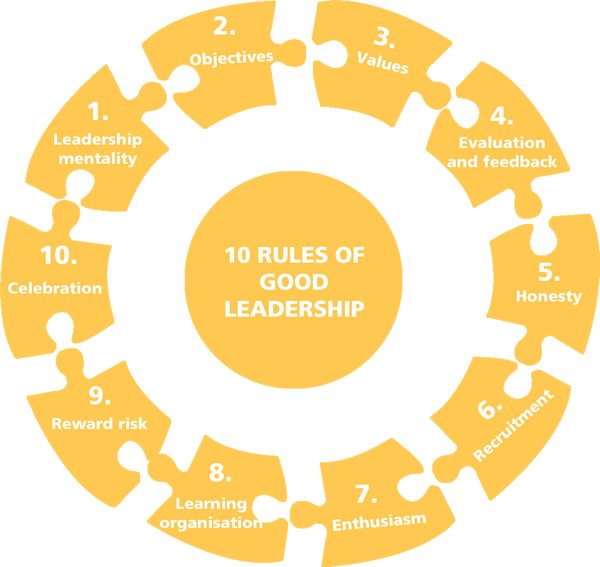Can you be honest with your employees? Can you give them feedback? Can you celebrate success? If you want to be a good leader, you have to know all this”. A good leader must follow the ten steps that were outlined some time ago by Jack Welch, the former chairman of General Electric, explained Danny Szpiro, a lecturer at IEDC and an expert for financial management.

LEADERSHIP MENTALITY
Your success as a leader does not depend on you but on your team. A leader cannot be successful if his team of employees isn’t achieving success. You usually assume a leadership position because you’re more capable than others. However, if you as the leader are the smartest and most capable on the team, you’ve obviously formed a bad team of employees. Therefore, leadership mentality means that you have to let go of being the smartest and best. You must compose a team of experts in their fields and create an environment where they can thrive.
OBJECTIVES
Success criteria and objectives must be clearly defined in your company. Also, every employee must be familiar with them. These objectives must be followed by your employees when concluding new transactions, when adopting key decisions and similar. It is therefore important that all employees are well aware of your objectives and what success means for the company. If you ask employees what the objectives of the company are, you must receive only one answer. If you get more, ask yourself whether your employees even know the company direction.
VALUES
Values are essential to achieve the set goals. Here, we’re actually dealing with how your employees behave in the company. It is imperative that the values can be seen, can be taught and learned, and can be rewarded. They can include, for example: speed, readiness to learn, and similar. If you notice that an employee improves in a certain field, you should reward him.
EVALUATION AND FEEDBACK
With annual and quarterly interviews, giving feedback has become very formalised. Giving feedback should not be understood as an event that happens in a specific period. He also recommended that you take the opportunity during any meeting with any employee to give feedback – comment on your employees’ work, how they follow the objectives, whether they’re meeting the objectives and complying with the objectives which you’ve set for the company.
For example, employees that are achieving good results and at the same time adhere to your values are those you can rely on to take on more important tasks in the company, explained Szpiro. However, if you’ve had to warn those that don’t achieve results and don’t adhere to your values multiple times, and they still had not improved, you need to ask yourself if they’re still worth investing into. The same applies to those employees that achieve results but are not in line with your company culture, and are perhaps even undermining it. In this case, says Szpiro, you should also ask yourself if they’re worth keeping in the company. Employees that act in accordance with the company culture are worth investing into, even if they’re currently not (yet) achieving desired results.
HONESTY
If you have an opinion about someone’s work, you have to let him know, emphasises Szpiro, but admits that that is one of the harder things of job coaching. “You’re most disrespectful to your employee if you don’t tell him what you think of his work. If you go to the employee with the worst results and let him know, but he’s surprised about this, then you’re not being honest with your employees,” added Szpiro. Therefore, stop beating around the bush when giving your employees feedback.
RECRUITMENT
You have to build a good team. Usually, business is like sports – in the end, the best team wins, said Szpiro. However, if you make a mistake in recruitment, it is usually not the end of the world. The main thing is how you deal with this mistake and solve it. When you employ someone, you have to make sure that the new employee is going to be successful and also that he is going to develop.
ENTHUSIASM
Once you build a good team of employees and provide them with sufficient feedback, you also have to make sure that your employees are as enthusiastic as possible. You can achieve this, according to Szpiro, by listening to them, respecting and enquiring about their opinions, and not only giving them tasks to complete.
LEARNING ORGANIZATION
Very few companies survive without changing, or by always doing the same things, like they were done five years ago. Therefore, Szpiro suggests that, as a leader, you must create an environment in which your employees will accept changes. Your employees must understand that they can improve, and that there is, in all likelihood, a company that does thing better than your company, added Szpiro. In other words, prepare your employees to accept changes and to follow the examples of those more successful.
REWARD RISK
If you want to be open to changes, you have to be willing to reward risk, also added Szpiro. You have to promote employees’ innovations and accept the fact that not every innovation will succeed. If you punish your employee because his idea failed, don’t expect your employees to come up with any new ideas, warned Szpiro.
CELEBRATION
Are you celebrating company successes? If not, start doing so, advised Szpiro. This is primarily about showing that you appreciate employees’ work and achievement. You don’t have to organise a huge party for every success, but show your employees that you can appreciate success.